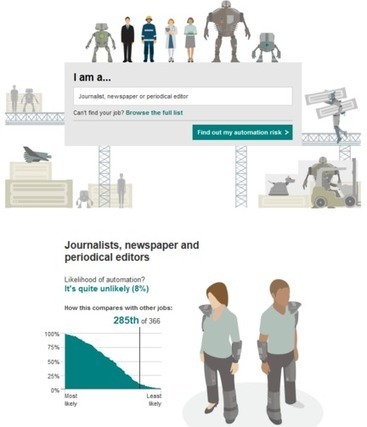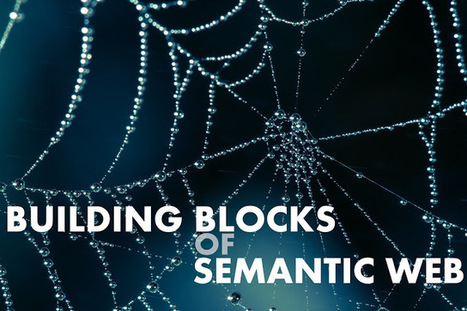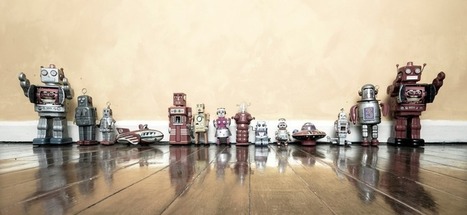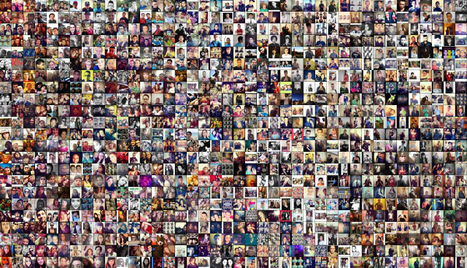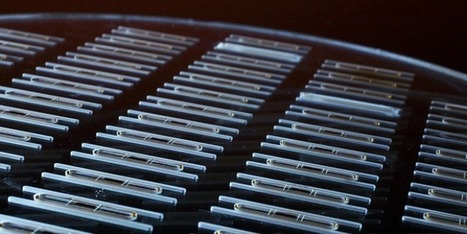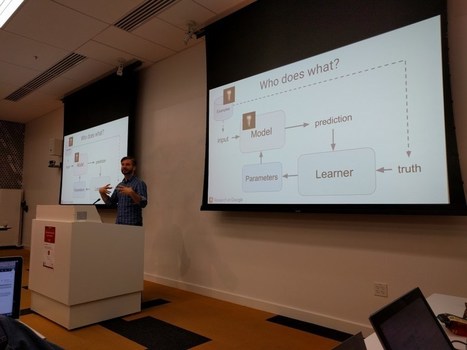 Your new post is loading...
 Your new post is loading...

|
Scooped by
Pierre Tran
December 25, 2015 1:32 PM
|
Les recherches en intelligence artificielle font de tels progrès que des scientifiques réputés, comme le physicien Stephen Hawking, voient dans l’I.A. un danger pour l’Homme. Pourtant, selon les spécialistes, nous sommes très loin de voir un jour surgir une I.A. inamicale.

|
Scooped by
Pierre Tran
December 16, 2015 12:38 PM
|
Dans moins de quinze ans seront vraisemblablement avérées les prophéties de ceux qui annonçent la victoire sur la mort et le triomphe d’une forme de vie non biologique. Le slogan de Google « nous allons tuer la mort » n’est pas qu’une formule publicitaire. Car les technologies déchainées avancent inexorablement vers le moment où nous serons plus qu’humains. De la réparation de nos organes à leur fabrication, de la collection de nos pensées à leur téléchargement sur des formes artificielles, le jour n’est pas très loin où nous pourrons déclarer que nous avons aboli la mort. Que nous avons accompli le rêve prométhéen d’immortaliser ce qu’il y a de plus précieux en nous.

|
Scooped by
Pierre Tran
December 16, 2015 6:25 AM
|
The home of Artificial Intelligence and Machine Learning Information Resources : Information Resource Directory, News Stories, Videos, Twitter and Forum Streams.

|
Scooped by
Pierre Tran
December 16, 2015 5:11 AM
|
The main short term danger from AI isn’t how good it is, or who’s using it, but who isn’t: governments. This impacts every aspect of our interaction with the State, beginning with the ludicrous way in which we have to move papers around (at best, digitally) to tell one part of the government something another part of the government already knows. Companies like Amazon, Google, or Facebook are built upon the opposite principle. Every part of them knows everything any part of the company knows about you (or at least it behaves that way, even if in practice there are still plenty of awkward silos).

|
Scooped by
Pierre Tran
December 15, 2015 6:23 PM
|
This year, given the explosion of activity, my focus is on highlighting areas of innovation, rather than on trying to be comprehensive. Figure 1 showcases the new landscape of machine intelligence as we enter 2016

|
Scooped by
Pierre Tran
December 9, 2015 5:10 PM
|
We'll be immortal. As long as the robots don't kill us.

|
Rescooped by
Pierre Tran
from The Asymptotic Leap
December 7, 2015 11:19 PM
|
"Scientists from Japan have created touchable holograms which are named as Fairy lights. This development could well lead to human beings able to interact with holograms"
Via The Asymptotic Leap

|
Scooped by
Pierre Tran
December 5, 2015 5:39 AM
|
It's right out of Star Trek—literally

|
Scooped by
Pierre Tran
December 5, 2015 5:26 AM
|
"Today I’ll tell you that the next big advance is well underway and it’s being fueled by a recent technique in the field of Artificial Intelligence known as Deep Learning.” Tomasz’s overview starts from the 1970s with Semiconductors towards 2015-2020 with Deep Learning Revitalising Robotics (see image below).

|
Scooped by
Pierre Tran
December 4, 2015 1:27 PM
|
D'ici dix à vingt ans, des chercheurs ont calculé que près de la moitié des emplois au Japon pourront être effectués par des robots ou des systèmes d'intelligence artificielle.

|
Scooped by
Pierre Tran
November 22, 2015 10:25 AM
|
Earlier this week, Google made a splash when it released its TensorFlow artificial intelligence software on GitHub under an open-source license. Google has a sizable stable of AI talent, and AI is working behind the scenes in popular products, including Gmail and Google search, so AI tools from Google are a big deal.

|
Scooped by
Pierre Tran
November 22, 2015 10:15 AM
|
Artificial intelligence is a classic risk/reward technology. If developed safely and properly, it could be a great boon. If developed recklessly and improperly, it could pose a significant risk. Typically, we try to manage this risk/reward ratio through various regulatory mechanisms. But AI poses significant regulatory challenges. John Danaher, 21/22/2015

|
Scooped by
Pierre Tran
November 22, 2015 9:34 AM
|
There are two aspects to the possible future of the Web; one is that it is definitely going to be more social and more people-centric, but the other important characteristic is that it’s going to be more semantic in nature. The Web technologies that we have available today focus more on how pages are displayed and what content is displayed, rather than on the content itself. The semantic Web is a facet of technology that will allow this content to become meaningful for machines, and will enable them to process this content and help us share, combine and analyse content effectively.
|

|
Scooped by
Pierre Tran
December 21, 2015 1:41 PM
|
The future of AI isn't about one giant super-intelligence. Instead, it's about many small, dedicated agents that know you intimately and work on your behalf to improve your everyday life. That could be helping you shop, get to work or, even, find a partner.

|
Scooped by
Pierre Tran
December 16, 2015 11:11 AM
|
Elon Musk and other Silicon Valley juggernauts are making a billion-dollar investment in Open AI, which is a non-profit company that doubles as a research lab.

|
Scooped by
Pierre Tran
December 16, 2015 6:07 AM
|
For many of us, the Internet is a place to network, as well as a link to people and businesses all over the world. This phenomenon is a prime example of human assemblage , says Social and Literary Critic Dr. Katherine Hayles, and it might also be a preview of how technology may continue to shape mankind.

|
Scooped by
Pierre Tran
December 15, 2015 6:42 PM
|
Current warfare seems ugly enough, what with the drones and Kalashnikovs. But add a dose of computerized efficiency, and the battlefield of the future could be one truly optimized—and terrifying—killing machine.

|
Scooped by
Pierre Tran
December 9, 2015 5:58 PM
|
Microsoft Chief Scientist Xuedong Huang talks about the power and potential of speech recognition and of artificial intelligence.

|
Scooped by
Pierre Tran
December 9, 2015 3:41 PM
|
IoT is about to explode, perhaps literally, if privacy and security issues aren't fixed.

|
Scooped by
Pierre Tran
December 7, 2015 4:23 AM
|
Artificial Intelligence is here and it’s changing every aspect of how business functions. But it’s not replacing people one job function at a time. It’s making people in every job function more efficient by handling the easy cases and watching and learning from the hard cases.

|
Scooped by
Pierre Tran
December 5, 2015 5:29 AM
|
At RE•WORK Deep Learning Summit, Andrej will be discussing 'Visualizing and Understanding Recurrent Networks'. Recurrent neural networks (RNNs), and specifically a variant with long short-term memory (LSTM), are enjoying renewed interest as a result of successful applications in a wide range of machine learning problems that involve sequential data.

|
Scooped by
Pierre Tran
December 5, 2015 5:23 AM
|
When people talk about “the next big thing,” they’re never thinking big enough. It’s not a lack of imagination; it’s a lack of observation. I’ve maintained that the future is always within sight, and you don’t need to imagine what’s already there. Case in point: The buzz surrounding the Internet of Things. What’s the buzz?…

|
Scooped by
Pierre Tran
November 22, 2015 10:26 AM
|
In the past couple of years, Google has been trying to improve more and more of its services with artificial intelligence. Google also happens to own a quantum computer -- a system capable of performing certain computations faster than classical computers.

|
Scooped by
Pierre Tran
November 22, 2015 10:23 AM
|
A robot developed by the National Institute of Informatics is now smart enough to be accepted into most Japanese universities—but not the notoriously selective University of Tokyo.

|
Scooped by
Pierre Tran
November 22, 2015 9:37 AM
|
C’est au tour de la Banque d’Angleterre et de la banque d’investissement Bank of America Merrill Lynch de nous mettre en garde contre le développement de la robotique et de l’intelligence artificielle. Selon eux, 35% des britanniques pourraient être remplacés par des robots et perdre leur emploi. Un taux qui monterait jusqu’à 47% aux Etats-Unis.
|
 Your new post is loading...
Your new post is loading...
 Your new post is loading...
Your new post is loading...

















